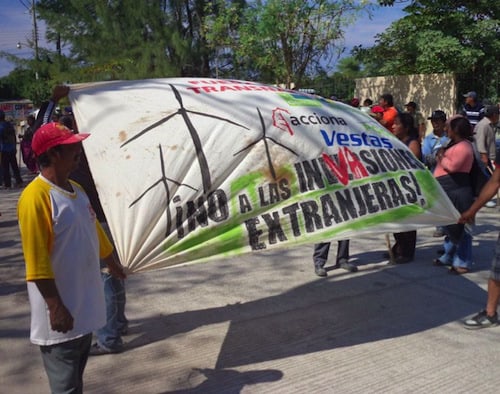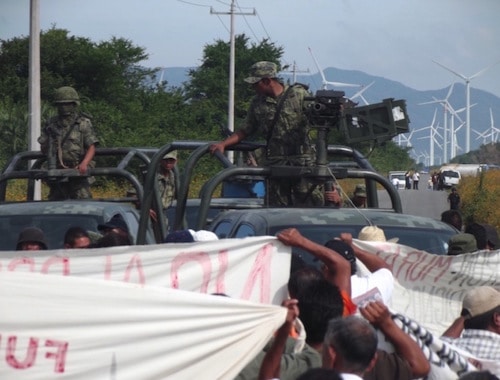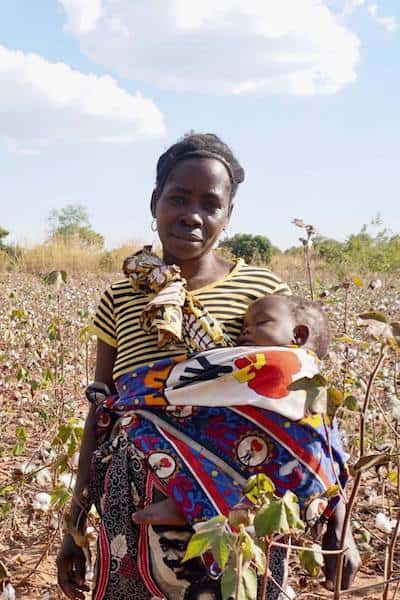Clean Energy Investments Do Not Always Mean a Clean Human Rights Record
Investing in renewable energy seems like a savvy, progressive investor’s ideal scenario. Public policy, popular demand and shifting technologies are all converging to create a potentially high-growth, high-return industry that benefits the environment. But in the transition to renewables, are investors overlooking any issues? Who truly benefits from these investments? Who gets left behind?
If we are to have a fast transition to renewables, investors should seek to ensure that it is a fair one. Unfortunately, this has not consistently been the experience of communities on the ground, who have faced land grabs, displacement, violation of indigenous rights, and violence against human rights defenders. All in the wake of renewable energy investment decisions being made without consulting local communities.
Unfortunately, multiple case studies exist showing the damages that can be caused by a clean energy project that does not respect the local community. One is that of the Cerro de Oro dam in Mexico, co-owned by Comexhidro and the Latin Power III fund (managed by Conduit Capital Partners), and partially financed by the Overseas Private Investment Corp. (OPIC). Indigenous communities submitted a complaint to OPIC’s Office of Accountability raising concerns about the impact of the dam on their safety, access to water, and fishing areas. The project had been planned as a three-year, $30 million project, and construction had already begun in 2010. However, the complaint and community protests forced construction to be halted in February 2011, resulting in losses for the investors. After dialogues with OPIC, local and regional government officials, the project was suspended.
Another unfortunate case study is that of the Agua Zarca dam in Honduras. In 2016, Berta Cáceres, an internationally recognized indigenous community leader and human rights defender, was murdered because of her protest of this hydropower project. COPINH, the organization she led, claimed the project developer, DESA, had failed to obtain the free prior and informed consent (FPIC) of the Lenca people. Loans to the project had been provided by FMO, a Dutch Bank; FinnFund, a Finish Finance company; and the Central American Bank of Economic Integration (Cabei). FMO, FinnFund and Cabei only suspended their loans after a DESA employee was arrested in connection with Cáceres’ murder.
 It is clear that the standards of community engagement currently used by project developers and investors are not sufficient to ensure respect for human rights and the adequate consideration of community benefits.
It is clear that the standards of community engagement currently used by project developers and investors are not sufficient to ensure respect for human rights and the adequate consideration of community benefits.
Concerned that renewable energy investors were not paying attention to these important issues, we co-authored, along with the Business & Human Rights Resource Centre and Sonen Capital, an Investor Briefing on renewable energy investment risks related to human rights and community perspectives. The need for this investor briefing was catalysed by data uncovered by BHRRC: what seemed at first like an anomaly turned out to be rather common. BHRRC approached 50 companies involved in renewable energy projects with 10 questions about their human rights policies. The responses revealed a significant lack of commitments and practices to prevent negative impacts on communities. Only 10 percent of respondents (five companies) referred to the international standard of free, prior and informed consent (FPIC) and three out of these five companies faced allegations from communities on implementing this commitment on the ground.
The extractives sector learned the hard way how essential it is to seek to develop meaningful human rights policies. A Harvard University study found significant costs for extractives companies as a result of company-community conflicts, with write-offs up to $379 million in assets and $1.33 billion in projected reserves. Despite the good PR of renewable energy, its human rights challenges mirror those of the land-reliant extractive industry. Investors expect renewable energy projects to exceed the human rights standards of the extractives industry. But, of course, business disruption and excess risk don’t give you a free pass simply because you’re doing something good for the environment.
The Business & Human Rights Resource Centre has tracked a rise in reports of renewable energy projects negatively affecting the communities where they operate. These violations, and the lack of community buy-in, have also exposed renewable energy investors to financial risk. Wind and small hydro projects in particular have been stalled or cancelled based on human rights and community engagement concerns. These costs arise from a range of factors including an erosion of social license to operate, administrative proceedings, litigation, poor publicity, demonstrations, blockades, damage to property and violence.
The Current Regulatory Framework is not Enough
The frameworks currently in place, such as the Equator Principles and the UN Guiding Principles on Business and Human Rights, provide a helpful floor for investors. Various international finance institutions (IFIs) have also introduced human rights language into their lending requirements. The latest revision of the World Bank’s social and environmental safeguards now includes a reference to free, prior and informed consent (FPIC) and meaningful consultation. Similarly, the International Finance Corporation (IFC)’s Performance Standards require private-sector projects receiving funding from the IFC to secure FPIC under most circumstances and incorporate affected communities’ input into their project planning. These standards can be used by investors as a starting point to assess human rights risks per sector and to set key performance indicators for companies.
However, given ongoing human rights allegations about IFI-funded projects, investors should be aware that investment by an IFI does not imply that a project’s human rights risks and impacts have been fully addressed. Therefore, conducting rigorous human rights due diligence separately is key even if IFI funding is present.
Investor Power – for Good
 As investors consider their exposure to, and ability to address, human rights challenges, their approach will vary by asset class. Investors may be as intimately involved in an investment as holding a board seat within a development company, or they may hold their exposure in an indexed fund where transparency and ability to direct the investments are more limited. Depending on the asset class and the number of intermediaries, investors may be many steps removed from the projects on the ground.
As investors consider their exposure to, and ability to address, human rights challenges, their approach will vary by asset class. Investors may be as intimately involved in an investment as holding a board seat within a development company, or they may hold their exposure in an indexed fund where transparency and ability to direct the investments are more limited. Depending on the asset class and the number of intermediaries, investors may be many steps removed from the projects on the ground.
Taking human rights into account before investing is the most impactful, particularly for illiquid investment. A recent study focused on the mining industry found that the most effective community relations involved “front-loading” the company’s investment in engagement – that is, investing manageable amounts early on in the planning of a project to win community support and goodwill, prior to construction and operations. It found that similar efforts later in project lifecycles were more expensive and far less durable, since lack of community support early on may require the need for greater investment later, with no guarantee of regaining community trust.
As the Investor Briefing details, easy solutions don’t exist. Investors that have the flexibility within their portfolios may wish to invest in community-led projects, as these are designed and developed by the people whose lives will be impacted by them. However, it’s likely that many investors are restricted to more familiar investment structures. It is with this audience in mind that the Investor Briefing details a number of steps that are wise to consider:
- Prior to investment: Engage affected communities even before the decision to invest is made, and ensure human rights due diligence is undertaken as per UN Guiding Principles on Business and Human Rights (UNGPs).
- During investment: Monitor human rights performance of investments and engage with companies to encourage respecting communities’ rights as per the UNGPs. If the company is not receptive, increase pressure through collaboration with peers, reputational tools or through divestment.
- Both prior to and during investment: Engage with companies or asset managers with specific questions on human rights and take steps to verify information; engage with governments, civil society, trade unions, communities and others to encourage community-led best practise and renewable energy that respects human rights. Be intensely inquisitive.
Investors have an opportunity to shape a new energy system that holds human rights at its core and emerge as champions of best practices in multi-stakeholder processes. Much needs to be done. Investors need to talk to each other about human rights best practices, as well as participate in networks where local and indigenous voices are represented. Most importantly, they need to take the lead from affected communities in developing and implementing policies and practices that are continuously adapted and improved.
The good news is that, while investors in renewable energy have a responsibility to respect human rights, they also benefit from doing so. Successful management of human rights impacts will likely reduce operational delays, legal costs and reputational risks. That is, if we, as investors, address this challenge correctly, we will all be able to come out on the right side of history and deserve the white hats we’d like to wear as we ride off into the solar arrays.
Andrea Armeni is the co-founder and executive director of Transform Finance.
Meredith Benton‘s work is focused on the intersection of human rights, environmental issues, financial incentives and business strategy.
Images courtesy of Grupo Yansa
- Categories
- Energy, Environment, Investing



